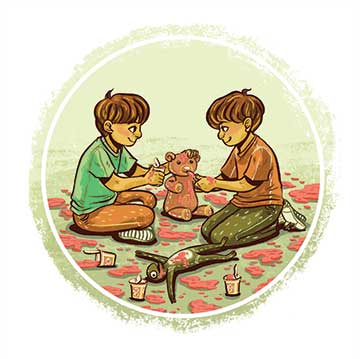KIDS ARE THE BEST AUTHORS OF THEIR OWN ESSAYS ON LIFE.
STORY BY Heather Kirk-Davidoff ILLUSTRATION BY Kelly Miller
While some families practice the high-touch, hands-on method called “Attachment Parenting,” my husband, Dan, and I have long joked that we practice “Detachment Parenting.” We give
 our kids plenty of love and attention, but we’ve never been afraid to ignore them, either. That is, until they started applying to college.
our kids plenty of love and attention, but we’ve never been afraid to ignore them, either. That is, until they started applying to college.
Our parenting style developed early on. Because we had twins, the parent on his or her own looki
ng after the kids was outnumbered. It just wasn’t possible to jump at every cry. As a result, our kids figured out that not every boo-boo needs a kiss. We had to let them roam free on the playground, and if our kids ate sand or went down the slide head first, they don’t seem to have suffered any lasting harm as a result. They ran ahead in the woods, looking for the next blaze or trail marker, and, as a result, became confident hikers at an early age.
As our children grew older, friends and relatives would often comment, “Your children are so good at entertaining themselves.” In other words, they were as happy to ignore our kids as we were. We took great pride in our ability to sit at the dinner table and talk with friends while our kids puttered about in the next room (until the night when they fed yogurt to all their stuffed animals, but that’s another story). Once our twins (and their younger sister) learned to read, they became even more self-sufficient. They biked around Columbia on their own, made their own lunches and did their own laundry.
But then, our twins reached their senior year in high school. College applications loomed and with them, the prospect of the boys moving away from home. Suddenly, Dan and I wanted to pen in our “free-range” children.
My husband, for his part, became obsessed with our children’s grades. Thanks to Aspen, an online tool offered by the Howard County Public School System, he could check their academic progress daily — sometimes hourly. He began emailing teachers to ask for more information about test scores and missing homework. When parent-teacher conferences came around, he scheduled 12 meetings with the teachers of our three kids, more conferences than we had attended in the previous three years combined.
“Why now?” one of the boys moaned one night, reading an email Dan wrote to his teacher. “You’ve never done this before! Why now?”
For my part, I directed my anxiety towards micromanaging the college application process. I considered grounding the boys until all applications were submitted, but realized that would be counterproductive. “How are you feeling about your applications?” I would ask them — daily. “Not too worried about it,” they would respond. This didn’t seem like a good sign to me. Wasn’t there a way to make them as anxious as I was? My hovering seemed to help.
When my kids finally completed drafts of their application essays, I read them closely and made a few careful suggestions about how they might be improved. Then, I made a few more suggestions. The next day, after thinking about the essays a lot more, I had just a few more suggestions. I thought of a better way to begin, a better way to end and a good anecdote to add in the middle. If only I could rewrite the essay myself, I mused, then these colleges would see just how brilliant my son is!
Then, midway through the process, we had dinner with friends whose daughter is also a high school senior. “How are college applications going?” I asked the girl. “Great!” she replied. “I submitted two last night.”
Her father responded, “Oh really?” His daughter had hit “send” on her application without asking for his feedback.
“Don’t you want to read her essays before she submits them?” I asked in disbelief. “I’ll read them if she wants me to,” he told me, “But in the end, it has to be her work. The colleges are assessing her — not me.”
I felt chastened, of course. But I also found myself wanting to argue. Are the colleges really just evaluating my kid’s academic abilities and potential? Aren’t they also evaluating my parenting — my ability to supervise and encourage, discipline and challenge my children for the past 18 years?
I mused about that question long after my sons hit “send” on their own applications. They wrote good essays. They didn’t take every one of my suggestions. They were able to express their peculiar insights about the world around them, insights that came out of their own experience, not mine. I’m proud of them — but I give myself some credit too. By backing off when they were young, I think Dan and I let our kids know that they are well equipped to explore the world on their own. Their confidence and curiosity are due in part to our “hands-off” style. Those qualities will serve them well, wherever they go to school.
But as they get ready to leave home, I need to teach myself what I worked hard to teach them. I can let go of them and let them explore the world on their own. It may get messy and it probably won’t be exactly the way I would do it. But like the sand they ate when they were toddlers, it will probably come out all right in the end. *




